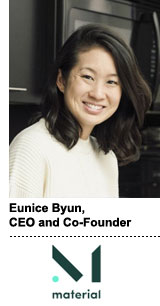
Ecommerce startup Material sells kitchen tools – including a chef’s knife, a wood spoon and one-handed kitchen tongs – meant to appeal to home chefs and people who like well-made, thoughtfully designed products.
But the direct-to-consumer brand’s challenge has been connecting with consumers using customer insights, not just site analytics and sales data.
“We take that extra step to humanize the digital experience,” said co-founder and CEO Eunice Byun, whose experience spans finance, business development and marketing.
For example, when Material started in March it only sold its essential kitchen tools in a $175 bundle. The initial offering sold out, and Material was growing month-over-month.
While Material could have continued on that path, customers said they wanted to buy à la carte: just the knives or just the kitchen tools.
Making a change was risky, since more choices can paralyze the consumer, Byun said. Selling smaller product sets would also reduce average order value (AOV), a key metric for any ecommerce company. But Material decided to listen to its customers.
It rolled out smaller kitchen sets – a $115 two-knife set and a $60 set of three kitchen tools – and emailed every person who asked them to roll out smaller sets to let them know they could buy just the knives or just the kitchen tools.
“The opportunity for direct-to-consumer brands like ourselves is for them to think there is a person on the other side, not a massive organization,” Byun said.
Surprisingly, the move increased conversions. And customers still ended up selecting the larger package of tools, keeping AOV high.
“Seeing multiple ways they could buy Material, customers started to understand the true value of the highest price point item,” Byun said. “Offering them more information gave them more ways to engage with the brand, and taught us how consumers process pricing information.”
The experiment also validated Material’s philosophy: listen to customers, and measure results.
Early on, Material created an “intimate customer test group” of its earliest adopters, Byun said, who regularly give product feedback and act as product testers, like for a serrated knife Material will add this fall.
Material’s broader marketing efforts likewise emphasize authentic connections, not just hitting a KPI. Although Material does some paid social media on Facebook, Pinterest and Instagram, it doesn’t pay influencers. The hope is that they will be inspired to post about Material’s products based simply on genuine satisfaction.
“We wanted to ensure that there was authenticity with the influencers we engaged with,” Byun said. “They are advocating for us because they like the products.”
Material keeps close track of how people posting about the brand on social media impacts site traffic and sales.
Each month, Material also reaches out to influencers in different interest categories – design, fashion, minimalist #mariekondo fans – to see how they respond to their products.
For example, when Eva Chen, head of fashion partnerships at Instagram, posted about Material on Instagram stories, Material monitored increases in web traffic.
Besides influencers, Material also looks for recent movers and people getting married, who often want to upgrade their stuff.
Via direct mail, which possesses precise targeting abilities around people who recently moved, Material is winning over one subset of those life stage customers.
It has also partnered with Zola to make it easier for customers to add Material’s products to their wedding registries.
Material is mindful of balancing paid and organic marketing to ensure long-term growth.
“For us, measurement is about ensuring we aren’t becoming over-reliant on paid media to drive sales,” Byun said. “When you are truly creating a brand and products that matter, having organic traffic and direct sales come your way is really important.”
If a customer buys the knives after seeing a friend use them or post about them on Instagram, and in turn loves the product so much they post about it, Byun knows Material is building a sustainable brand.
“We want to tie the qualitative data to the quantitative data we are seeing,” Byun said – combining old-fashioned personal connections with digitally tracked customer data.
This post was syndicated from Ad Exchanger.


More Stories
The Trade Desk’s OpenPass Adds Rewards As It Pursues Wider Adoption
NZME’s work recognised at INMA Global Media Awards
Leading Brand Transformation: A Masterclass With Doug Zarkin